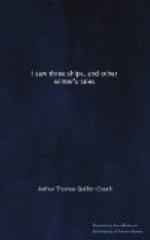“I don’t know who you may be, sir, but—”
“You are kind enough to excuse my rising to introduce myself. My name is Zebedee Minards.”
CHAPTER IV.
YOUNG ZEB FETCHES A CHEST OF DRAWERS.
The parish of Ruan Lanihale is bounded on the west by Porthlooe, a fishing town of fifteen hundred inhabitants or less, that blocks the seaward exit of a narrow coombe. A little stream tumbles down this coombe towards the “Hauen,” divides the folk into parishioners of Lanihale and Landaviddy, and receives impartially the fish offal of both. There is a good deal of this offal, especially during pilchard time, and the towns-folk live on their first storeys, using the lower floors as fish cellars, or “pallaces.” But even while the nose most abhors, the eye is delighted by jumbled houses, crazy stairways leading to green doors, a group of children dabbling in the mud at low tide, a congregation of white gulls, a line of fishing boats below the quay where the men lounge and whistle and the barked nets hang to dry, and, beyond all, the shorn outline of two cliffs with a wedge of sea and sky between.
Mr. Zebedee Minards the elder dwelt on the eastern or Lanihale side of the stream, and a good way back from the Hauen, beside the road that winds inland up the coombe. Twenty yards of garden divided his cottage door from the road, and prevented the inmates from breaking their necks as they stepped over its threshold. Even as it was, Old Zeb had acquired a habit of singing out “Ware heads!” to the wayfarers whenever he chanced to drop a rotund object on his estate; and if any small article were missing indoors, would descend at once to the highway with the cheerful assurance, based on repeated success, of finding it somewhere below.
Over and above its recurrent crop of potatoes and flatpoll cabbages, this precipitous garden depended for permanent interest on a collection of marine curiosities, all eloquent of disaster to shipping. To begin with, a colossal and highly varnished Cherokee, once the figure-head of a West Indiaman, stood sentry by the gate and hung forward over the road, to the discomfiture of unwarned and absent-minded bagmen. The path to the door was guarded by a low fence of split-bamboo baskets that had once contained sugar from Batavia; a coffee bag from the wreck of a Dutch barque served for door-mat; a rum-cask with a history caught rain-water from the eaves; and a lapdog’s pagoda—a dainty affair, striped in scarlet and yellow, the jetsom of some passenger ship—had been deftly adapted by Old Zeb, and stood in line with three straw bee-skips under the eastern wall.
The next day but one after Christmas dawned deliciously in Porthlooe, bright with virginal sunshine, and made tender by the breath of the Gulf Stream. Uncle Issy, passing up the road at nine o’clock, halted by the Cherokee to pass a word with its proprietor, who presented the very antipodes of a bird’s-eye view, as he knocked about the crumbling clods with his visgy at the top of the slope.




